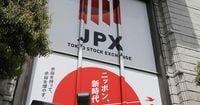On March 31, 2025, the Tokyo stock market experienced a significant downturn, with the Nikkei average falling sharply. The index dropped by over 1500 yen, breaking through the critical 36,000 yen mark for the first time in about three weeks. This decline was largely influenced by the previous week's poor performance in U.S. stocks, which heightened concerns about economic stability and inflation.
The Nikkei average, which started trading at 37,120 yen, saw its value plummet to approximately 35,600 yen, reflecting a drop of around 900 yen from its closing price at the end of the previous week. Analysts noted that the market's instability was exacerbated by President Trump's anticipated announcement regarding 'mutual tariffs' and the potential implementation of automobile tariffs within the week.
According to reports, the U.S. stock market's decline was linked to fears of stagflation, a situation where inflation persists despite economic stagnation. This concern arose following the release of U.S. economic indicators that pointed to ongoing inflation, which further dampened investor sentiment. The Dow Jones Industrial Average fell by 715 points, or 1.69%, closing at 41,583 dollars on March 28, 2025.
In the Tokyo market, semiconductor-related stocks, including Fast Retailing (9983.T) and Tokyo Electron (8035.T), were among the primary contributors to the index's decline. The combined negative impact of four significant stocks, including Advantest (6857.T) and SoftBank Group (9984.T), accounted for a drop of approximately 440 yen in the Nikkei average. This downturn was evident across all 33 sectors of the Tokyo Stock Exchange, with 97% of stocks on the TSE Prime market experiencing declines.
Market analysts, including Takehiko Iwamatsu from Tokai Tokyo Intelligence Lab, pointed out that the breach of the 36,000 yen support level indicates a lack of strong market confidence. Iwamatsu stated, "The market has broken through the 36,000 yen mark without resistance, leading to a situation where we are seeing a significant drop. This is concerning for investors who were hoping for a rebound."
Hidetoshi Suzuki, head of investment research at SBI Securities, expressed concerns that the downward trend in Japanese stocks could continue if U.S. economic indicators remain unfavorable. He suggested that while export-oriented stocks and high-tech companies may struggle, there could be a relative increase in interest for defense-related and domestic demand stocks.
As the week progresses, uncertainty looms over the market, particularly with the upcoming announcements regarding tariffs. Daiwa Securities' chief strategist, Hirokazu Kabeya, noted, "The market will likely remain unstable until we have a clearer picture of the mutual tariffs and automobile tariffs scheduled for announcement on April 2, 2025, and implementation on April 3, 2025." This uncertainty has led to increased volatility in trading, as investors await further developments.
In addition to the stock market news, other significant events occurred on March 31, 2025. The Liberal Democratic Party, Komeito, and the Democratic Party for the People reached an agreement to lower the disclosure threshold for corporate and organizational donations from over 1 million yen to over 50,000 yen. This decision aims to increase transparency in political funding.
The House of Representatives Special Committee on Political Reform postponed a vote on the bill to revise corporate and organizational donations, signaling ongoing debates about political financing in Japan. Meanwhile, the government released estimates concerning the potential impact of the Nankai Trough earthquake, predicting up to 298,000 fatalities and economic damages amounting to 292 trillion 200 billion yen.
In other news, the Ehime Prefecture's Imabari City declared a lockdown due to forest fires, emphasizing the ongoing environmental challenges facing the region. The House of Councillors Budget Committee approved the budget bill for the 2025 fiscal year, which is expected to shape Japan's economic landscape in the coming months.
As the stock market continues to react to external pressures and domestic developments, investors and analysts alike remain cautious. The interplay between U.S. economic indicators and Japanese market responses will be critical to monitor in the days ahead. With significant announcements on the horizon, the market's trajectory remains uncertain, leaving many to wonder how these factors will influence investment strategies moving forward.
Overall, the events of March 31, 2025, illustrate the complex dynamics of the global economy and its direct impact on local markets. As Japan navigates these challenges, the focus will be on adapting to shifting economic realities while maintaining investor confidence.






